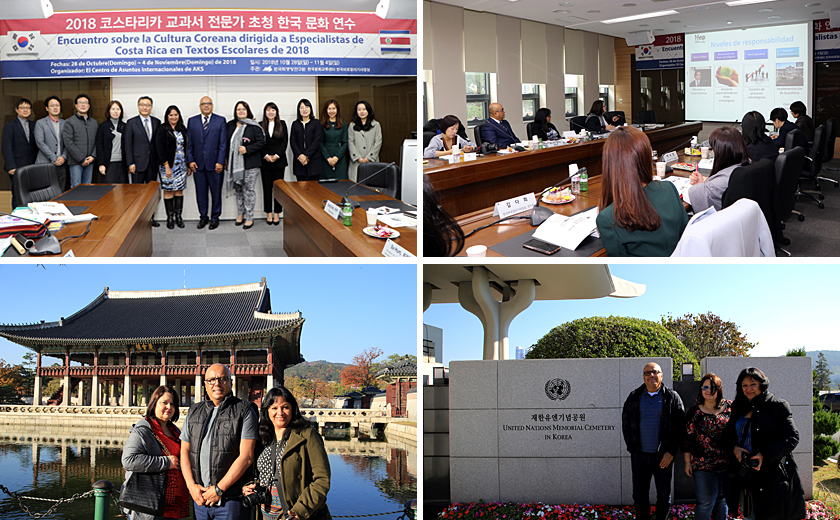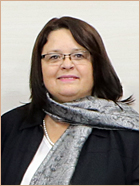Column
2018 Fellowship for Textbook Specialists of Costa Rica
Ties that bring culture, history, and education from South Korea to Costa Rica
The learning experience that I had the privilege of having in South Korea from October 26 to November 4, 2018 gave me the opportunity for personal and professional growth of great value in my career as an officer of the Costa Rican Ministry of Public Education.
I thank the Academy of Korean Studies for the immersive experience in Korean history and culture, which served as a unique opportunity to get to know this beautiful country not only through written or audiovisual references or conferences by experts -- to which we had extensive access before and during the trip – as well as to have a first-hand experience of their culture, religion, gastronomy, historical reference sites, temples, architectural beauties and, most importantly, to witness the warmth, kindness, and politeness of its people.
I want to highlight the care that the staff of the Academy of Korean Studies provided to the delegation of Costa Ricans participating in the experience. They took care of all the details so that this activity would be pleasant, at the same time making it productive in terms of achieving the objectives presented. The Academy of Korean Studies was able to meet the needs and interests of the group as well as the particular requirements that each one of us had.
Regarding the contents of the meeting, it is important to point out that a comparative and contrastive analysis of the Costa Rican and Korean educational systems was done. With regard to the Costa Rican educational system, the country's achievements in education were presented, especially in terms of coverage and educational services for public education. In general terms, we can conclude that both systems have similarities such as the national interest in betting on education as a means of social and economic mobility. Other similarities are the levels and educational cycles and subjects of the curriculum. Still, there are important differences, such as the percentage of students entering the university in South Korea (70%) and the achievements of this country in the PISA tests, performing differentiated high school tests -- general, specialized or special-purpose. It is important to highlight also that, within the content of the meeting, it was possible to contrast the vision that Costa Rica has about the content of "Korea" in the curriculum, which is specifically addressed within the areas of recent history – as included in the secondary education -- in the Social Studies class. It was clarified that the public education system in Costa Rica does not use or promote the use of official school texts. It was considered a viable option for Costa Rica, based on the explanation and demonstration of the tools and resources that the educational system has, to approach the contents on Korean culture and history from a more integrative perspective in the curriculum of various classes and subjects -- such as popular culture, traditions, and gastronomy among other aspects -- as a follow-up of the meeting.
It is very important to highlight the experience of approaching Korean history and culture through visits to several sites and cities organized by the Academy of Korean Studies and reinforced by the presentation of experts on the history and culture of Korea. From this wonderful experience, I would like to mention the following as those of great significance: World Heritage Site "Hawseong Haenggung," Busan City, UN Memorial Cemetery, Gamcheon Village, Busan International Market, Gyeongju I and II Historic Areas, Seoul City’s Gyeongbokgung Palace, Bukchon Village, etc. together with the theater and Temple, Insa-dong, Changdeokgung Palace.
All the purposes of the meeting were effectively achieved thanks to the excellent organization and development of the activities planned by the Academy of Korean Studies.
Finally, the meeting that was held offered the opportunity to know, compare, and contrast the educational system, history, and culture of South Korea with those of Costa Rica. This experience enabled the connection and interaction of people in an increasingly globalized world, where it is necessary to emphasize essential skills that include values, attitudes, and communication skills as well as cognitive knowledge, which are always dynamic and changing.
I really appreciate the experience I have had, and I wish to suggest to the Academy of Korean Studies that this experience of immersion in the culture and history of South Korea be extended to more people and countries of the region so that their ties with this country become stronger, as in the case of Costa Rica.
I thank the Academy of Korean Studies for the immersive experience in Korean history and culture, which served as a unique opportunity to get to know this beautiful country not only through written or audiovisual references or conferences by experts -- to which we had extensive access before and during the trip – as well as to have a first-hand experience of their culture, religion, gastronomy, historical reference sites, temples, architectural beauties and, most importantly, to witness the warmth, kindness, and politeness of its people.
I want to highlight the care that the staff of the Academy of Korean Studies provided to the delegation of Costa Ricans participating in the experience. They took care of all the details so that this activity would be pleasant, at the same time making it productive in terms of achieving the objectives presented. The Academy of Korean Studies was able to meet the needs and interests of the group as well as the particular requirements that each one of us had.
Regarding the contents of the meeting, it is important to point out that a comparative and contrastive analysis of the Costa Rican and Korean educational systems was done. With regard to the Costa Rican educational system, the country's achievements in education were presented, especially in terms of coverage and educational services for public education. In general terms, we can conclude that both systems have similarities such as the national interest in betting on education as a means of social and economic mobility. Other similarities are the levels and educational cycles and subjects of the curriculum. Still, there are important differences, such as the percentage of students entering the university in South Korea (70%) and the achievements of this country in the PISA tests, performing differentiated high school tests -- general, specialized or special-purpose. It is important to highlight also that, within the content of the meeting, it was possible to contrast the vision that Costa Rica has about the content of "Korea" in the curriculum, which is specifically addressed within the areas of recent history – as included in the secondary education -- in the Social Studies class. It was clarified that the public education system in Costa Rica does not use or promote the use of official school texts. It was considered a viable option for Costa Rica, based on the explanation and demonstration of the tools and resources that the educational system has, to approach the contents on Korean culture and history from a more integrative perspective in the curriculum of various classes and subjects -- such as popular culture, traditions, and gastronomy among other aspects -- as a follow-up of the meeting.
It is very important to highlight the experience of approaching Korean history and culture through visits to several sites and cities organized by the Academy of Korean Studies and reinforced by the presentation of experts on the history and culture of Korea. From this wonderful experience, I would like to mention the following as those of great significance: World Heritage Site "Hawseong Haenggung," Busan City, UN Memorial Cemetery, Gamcheon Village, Busan International Market, Gyeongju I and II Historic Areas, Seoul City’s Gyeongbokgung Palace, Bukchon Village, etc. together with the theater and Temple, Insa-dong, Changdeokgung Palace.
All the purposes of the meeting were effectively achieved thanks to the excellent organization and development of the activities planned by the Academy of Korean Studies.
Finally, the meeting that was held offered the opportunity to know, compare, and contrast the educational system, history, and culture of South Korea with those of Costa Rica. This experience enabled the connection and interaction of people in an increasingly globalized world, where it is necessary to emphasize essential skills that include values, attitudes, and communication skills as well as cognitive knowledge, which are always dynamic and changing.
I really appreciate the experience I have had, and I wish to suggest to the Academy of Korean Studies that this experience of immersion in the culture and history of South Korea be extended to more people and countries of the region so that their ties with this country become stronger, as in the case of Costa Rica.



